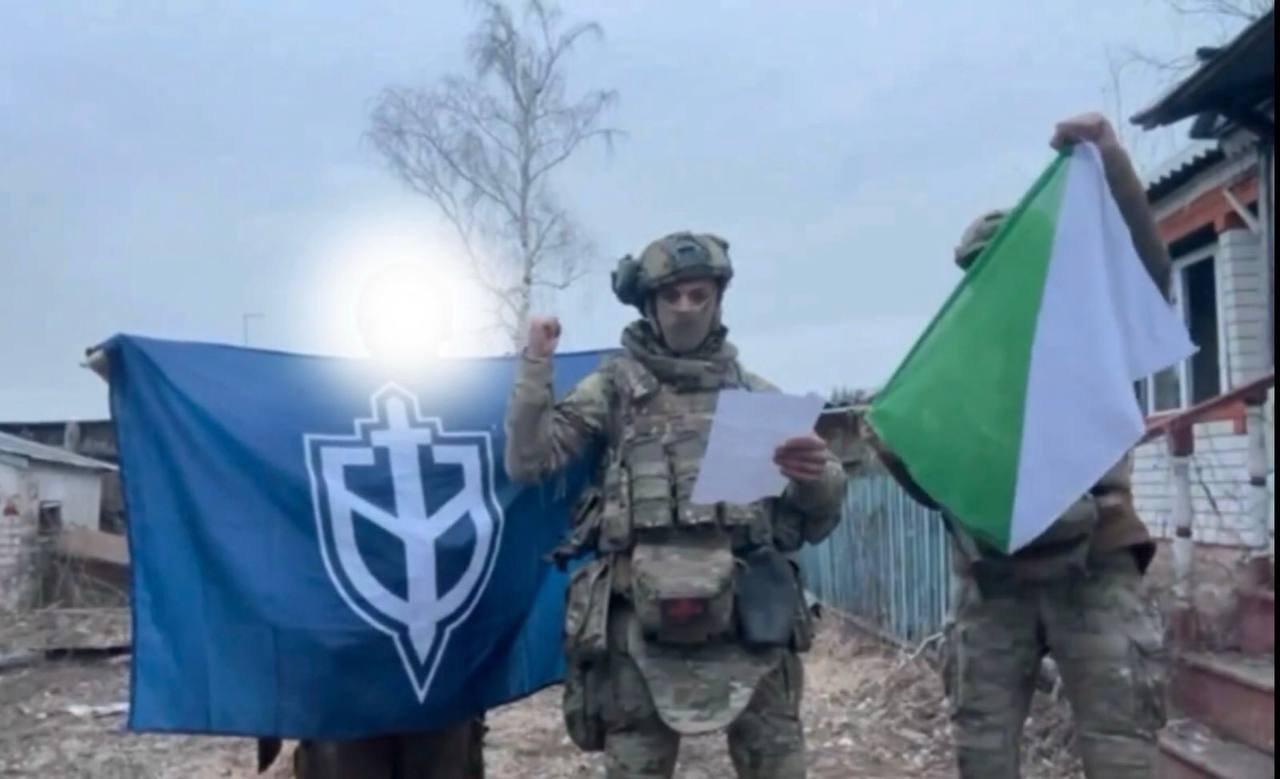It is the eleventh day of the operation of Russian volunteer anti-Kremlin fighters in Russia’s regions bordering Ukraine.
The fighting on Russian soil has flaunted one of Vladimir Putin’s “red lines,” with no ensuing repercussions.
The volunteers, comprising the Free Russian Legion, Russian Volunteer Corps, and newly-minted Siberian Battalion, which fight alongside Ukraine against Russian invading troops, have claimed that their joint operation has thwarted a major Russian offensive on Ukraine.
This is the second such operation of the anti-Kremlin fighters on Russian soil: their first raids were conducted in March and May 2023. The volunteer fighters now call on all Russians to join their ranks to fight against Putin’s regime. Here is how the events developed.
Taking the fight to Russia
On 12 March, the three battalions announced the start of their joint operation to “bring freedom and justice to Russian land.” The battalions reported having taken control of the border village of Lozovaya Rudka in the Belgorod Oblast.
Soon, they also claimed control of Tyotkino, Kursk Oblast. Particularly, they reported destroying an ammunition depot there.
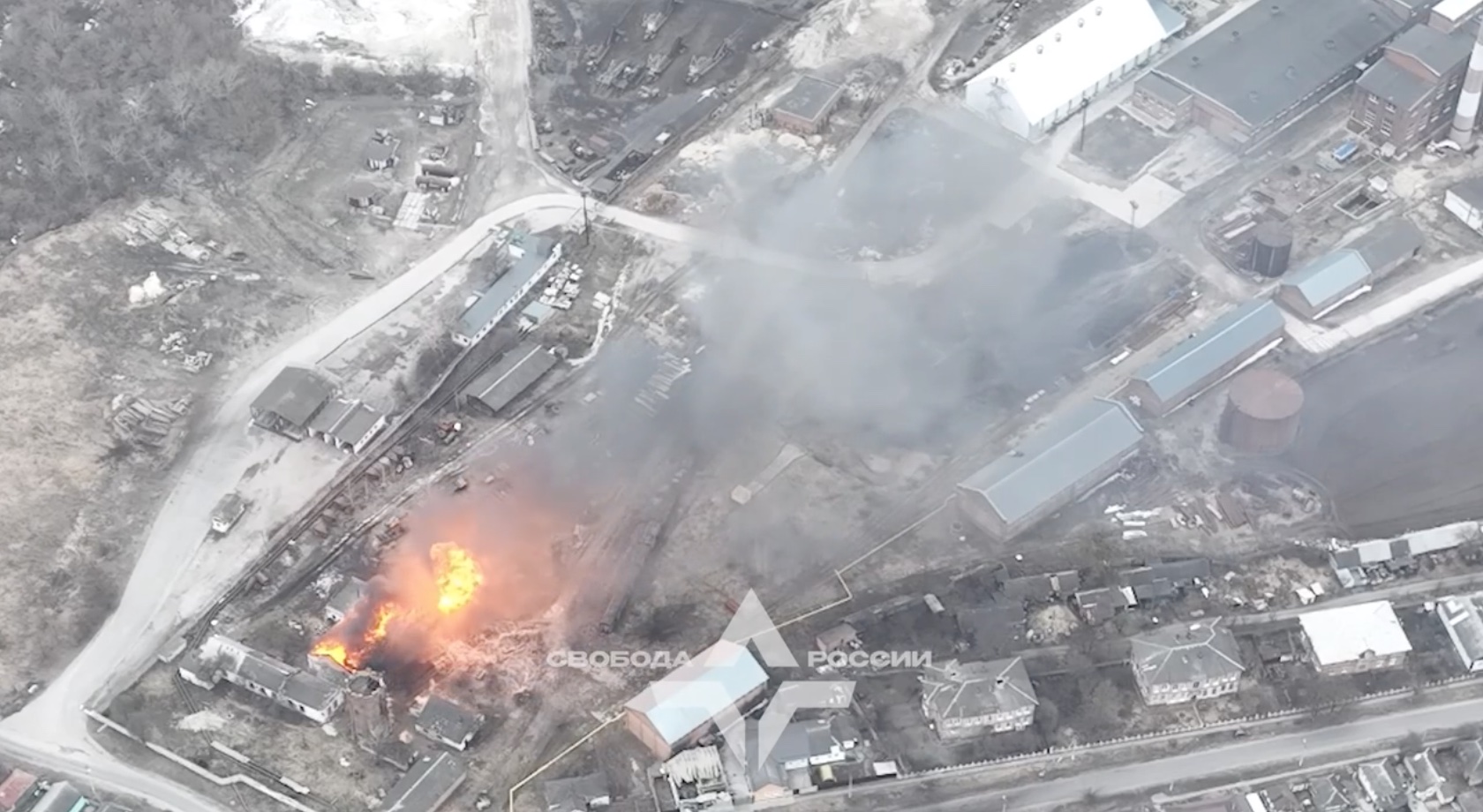
On 17 March, the fighting was reported to spread to Belgorod Oblast.
The Siberian Battalion had reported taking control of the settlement of Gorkovsky, acting in union with volunteer units from Chechnya fighting on the side of Ukraine.
The battalions have repeatedly urged residents of the Belgorod and Kursk oblasts to evacuate as they were “forced to strike at military positions located in the cities of Belgorod and Kursk.”
The anti-Kremlin battalions also reported to have raised their flags over Kozinka in Belgorod Oblast.
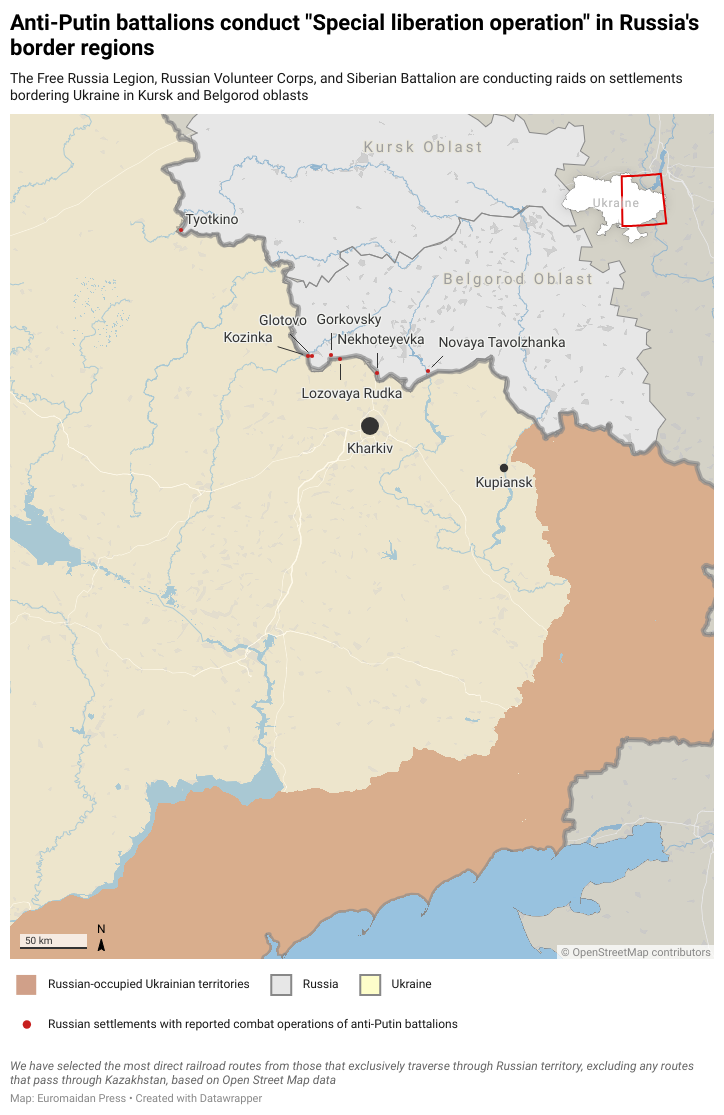
Speaking at a press conference of the Russian armed volunteer battalions, Denis Nikitin, commander of the Russia Volunteer Corps, stated that while the insurgents currently control only two villages, their aim is not to ensure vast territorial control, as they “soberly” assess the size of their forces and are not strong enough to capture district centers and hold them.
He nevertheless pointed out that one year ago, during the operation in Bryansk Oblast, the rebels could stay on Russian territory for only several hours, whereas now their operations last for days, destroying Russian army soldiers and controlling regions.
https://twitter.com/EuromaidanPress/status/1770507104060571850?t=wOj7hhBcXFQZEqOMZrrGCA&s=19
There is no point in holding on to the ruins of villages after the Russian army has destroyed them, Nikitin added. Rather, the Russian rebels apply “classic” partisan tactics against a numerically superior enemy, involving lightning-fast movements and unexpected strikes, while facing difficulties to avoid damage to the civilian population.
https://twitter.com/EuromaidanPress/status/1770780320733774292?t=qN45g7swvNuAL0Sgz2MWoA&s=19
Reported damage to the Russian Federation
On 18 March, the anti-Putin fighters shared a tally of the damage suffered by the Russian troops, claiming that they had destroyed 130 units of equipment. Destroyed equipment:
- 7 tanks (including three T-72, one T-72BZ)
- 20 infantry fighting vehicles (including BMP-2, BMP-3)
- 6 D-30 howitzers
- 4 armored personnel carriers
- 4 mortars
- 2 MT-12 “Rapira”
- 2 2S19 “Msta-S”
- 2 ZALA UAVs
- 1 BM 21 “Grad”
- 1 SPG
- 1 “Murom” complex
- 1 electronic warfare station
- 1 repeater
- 2 units of armored vehicle equipment
- 2 units of engineering equipment (excavators)
- 57 units of various automotive equipment (heavy and light)
Disabled equipment:
- 1 T-80PVM tank
- 1 T-72 tank
- 1 infantry fighting vehicle
- 1 BM 21 “Grad”
- 2 MT-LB
- 1 Msta-B
- 1 TOS-2
- 1 BM 21 “Grad”
- 1 2S1 “Gvozdika”
- 1 electronic warfare station
- 1 armored vehicle
- 20 units of various automotive equipment (heavy and light)
The Free Russia Legion noted that “the greatest damage was done to Putin’s image as a figure who supposedly can keep the situation in the country under control. On 21 March, during a press conference, representatives of the battalions claimed that the Russian manpower losses were:
- 651 irreversible losses
- 908 sanitary losses (wounded soldiers)
- 37 taken captive.
“They (Russian military commanders – ed.) were forced [..] to transfer significant forces, in particular from the Kharkiv and Kupiansk directions, to hold ‘their’ Belgorod and Kursk oblasts […],” said a representative of the Free Russia Legion, Aleksei Baranovsky.
Representatives of the Free Russia Legion, the Russian Volunteer Corps, and the Siberian Battalion said during the press conference that their “special liberation operation of Russia from Putin” continues.
The current task is not to keep certain settlements in Russia under control but primarily to conduct guerrilla work, as well as to “push the enemy as far away from the Ukrainian border as possible.”
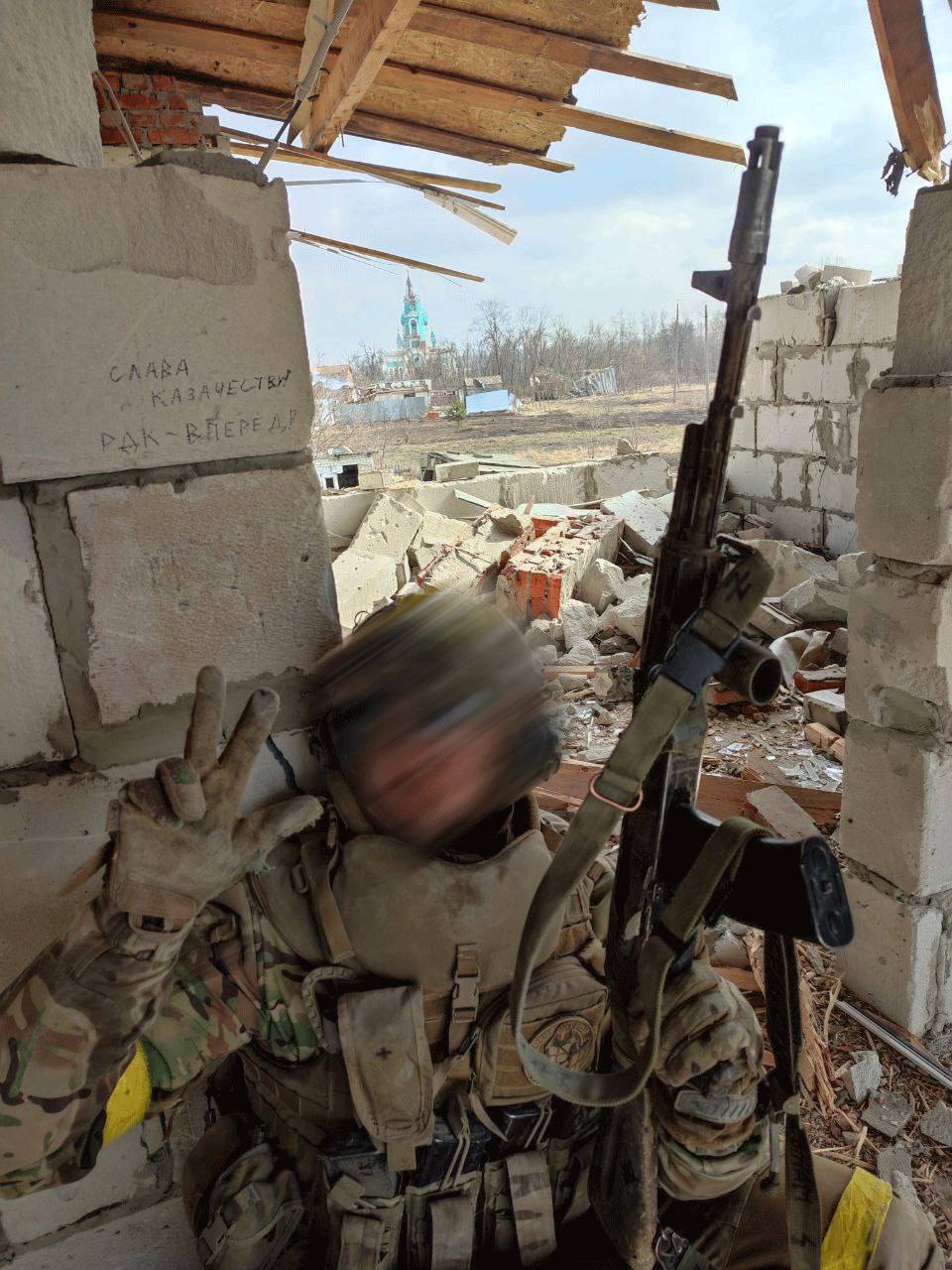
Does Ukraine help, and whose weapons do the anti-Kremlin battalions use?
A representative of Ukraine’s Military Intelligence, Andrii Yusov, told RFE/RL that the Russian Freedom Legion, the Russian Volunteer Corps, and the Siberian Battalion are units composed of citizens of the Russian Federation.
While they are full-fledged units of the Ukrainian Armed Forces, on Russian territory, the Russian anti-Kremlin battalions act completely autonomously and independently, carrying out their socio-political agenda, Yusov said, reminding about the 2023 similar operations of these units.
— Euromaidan Press (@EuromaidanPress) March 19, 2024
Yet, the Defence Intelligence of Ukraine is assisting the Russian Volunteer Corps, the Russian Freedom Legion, and the Siberian Battalion during their operations in Russia, Yusov said later. He admitted that Ukraine’s intelligence helps the Russian rebels because it is Ukraine’s duty, as these people are helping to liberate Ukraine from the occupiers.
“They are acting courageously and heroically in many parts of the frontline, taking direct part in serious operations,” Yusov said.
Apart from using Ukrainian intelligence, in their operations on Russian soil, the anti-Kremlin fighters rely on Ukrainian logistics, according to Denis Nikitin, commander of the Russian Volunteer Corps speaking during a press conference on Thursday, 21 March. For instance, to evacuate their wounded.
“Generally speaking, the entire military infrastructure of our unit is interconnected with the military infrastructure of the Armed Forces of Ukraine and the Ministry of Defense of Ukraine. Therefore, of course, we receive the necessary support from the Ukrainian side to fulfill our combat missions on the territory of the Russian Federation,” Nikitin added.
But whose weapons are they using during the operations?
Aleksey Baranovsky, a fighter of the Russian Freedom Legion, shied away from a direct answer during the press conference. According to him, while fighting on Ukrainian territory, the Russian volunteers are servicemen of the Ukrainian Army and can use all the weapons and equipment attached to them as a detachment of Ukraine’s International Legion.
But as soon as they cross the border into Russia, they become “Russian citizens who have picked up arms.” The arms, Baranovsky claims, are of trophy and “double-trophy” origin, meaning that some arms were taken as trophies by invading Russian troops, after which they were again taken as trophies but back into the Ukrainian Army.
Russian Volunteer Corps fights for Ukraine and to dismantle Putin’s regime
“Accordingly, we also have various Ukrainian-made equipment at our disposal. That is, we operate as a full-fledged Ukrainian unit on the territory of Ukraine and as rebel units, a guerrilla army, when we go to Russia,” he added.
One must not forget the “voentorgs,” the proverbial military stores where Russian proxy troops in eastern Ukraine claimed to get the Russian tanks they used to fight against Ukraine during 2014, Nikitin trolled.
“As you know, since 2014, it has been possible to buy small arms, tanks, and multiple rocket launchers in a modern military store. Therefore, if you have the opportunity, and we are fortunate enough to have such opportunities, you can buy any small arms, and we certainly take advantage of this,” Nikitin joked, nevertheless adding that most of their equipment is trophy Russian equipment.
This tacitly implies that Ukraine could be blessing the weapons the volunteers use on Russian soil, as the term “voentorg” was jokingly used to conceal Russia’s covert supply of military equipment to its proxy “republics” in eastern Ukraine.
Purpose of the anti-Putin fighters’ raid into Russia
“We were able to open a second front. […] Now the theater of military operations is not only the territory of Ukraine, but also the territory of the Russian Federation. Through such an expansion, through such an extension of the front line, we managed to weaken the pressure of the Kremlin’s military machine in other parts of the front,” Denis Nikitin, commander of the Russian Volunteer Corps, told during a joint press conference on 21 March.
Nikitin’s claim is supported by a source of Bloomberg, who stated that the attacks are forcing the Kremlin to divert forces from the frontline in Ukraine.
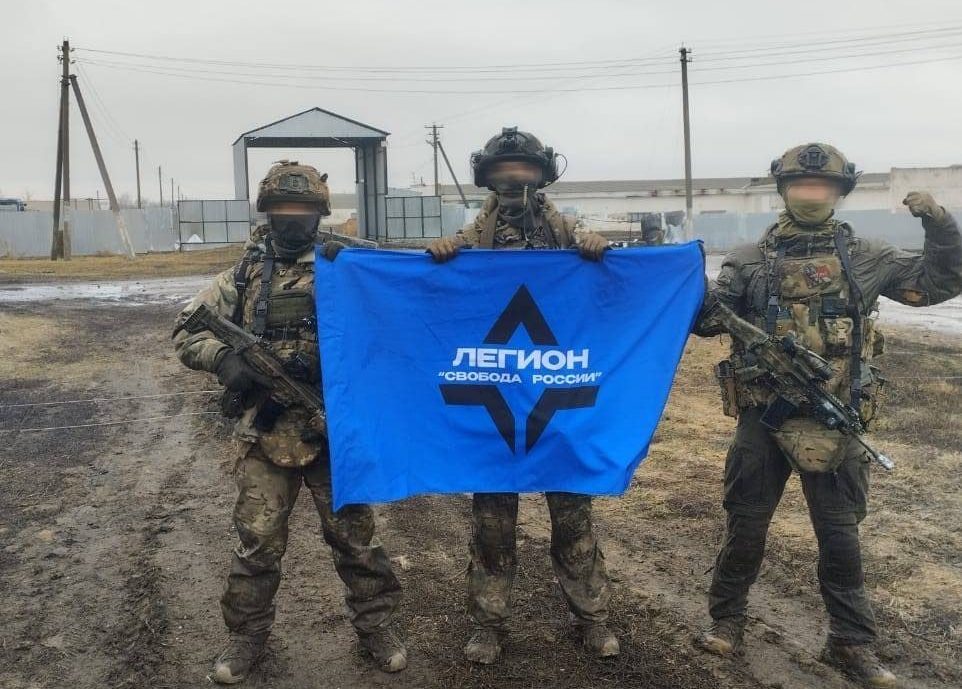
Additionally, Aleksey Baranovsky, representative of the Free Russia Legion, claimed that the special operation of Russian volunteers in the Belgorod and Kursk oblasts of the Russian Federation helped disrupt a new offensive by the Russian occupiers on Ukraine.
According to Baranovsky, the Russian troops wanted to conduct a new offensive before the so-called Russian presidential elections on 17 March.
“Our operation disrupted these plans. In a military sense, they were forced to transfer significant forces from near Kupiansk to hold the Belgorod and Kursk oblasts. In fact, we disrupted the offensive plans of the Russian army,” Baranovsky said.
The volunteer fighter also noted that the raid in the Belgorod and Kursk oblasts helped the Armed Forces of Ukraine stabilize the front.
“We diverted tactical aviation to ourselves, it delivered more than 320 airstrikes, all the bombs arrived on the territory of Russia. Thanks to our operation, the Armed Forces of Ukraine were able to stabilize the front and cover the areas where a massive attack by Russia was expected,” he summarized.
Armed struggle emerges as focus of Russian opposition
Free Russia Corps commander Denis Nikitin, who in 2023 shared with Euromaidan Press his disbelief that any peaceful methods of the Russian opposition could lead to change in Russia, observes a shift in their position in the third year of Russia’s war against Ukraine.
“Thank God, their position has begun to change, and they have realized that round tables, forums, signature collections, paper cups, and releasing lanterns into the sky are incapable of budging an eastern despotism like Putin’s regime,” Nikitin stated during the press conference of the volunteer fighters.
One month ago, Russian authorities announced the death of opposition politician Aleksei Navalny in prison, leading to widespread disillusionment among Russians about the possibility to change Russia’s leadership with democratic methods.
Nikitin believes that all efforts of the non-systemic opposition should be directed towards supporting the fighting Russian volunteer units. “We are at the forefront of the attack and serve as the spearhead that must pierce the heart of Putin’s regime and, possibly, the heart of Russia itself,” he declared.
Nikitin strongly opposes any meaningless statements or empty actions that do not ultimately lead to the actual strengthening of their units, stating that “there is no struggle other than an armed one.”
He notes that fortunately, many representatives of the systemic opposition acknowledge this fact.
“If they are not ready to take part in this war in the same form of armed struggle, they should help the Russian Volunteer Corps. Otherwise, they should not call themselves the Russian opposition,” Nikitin concluded.
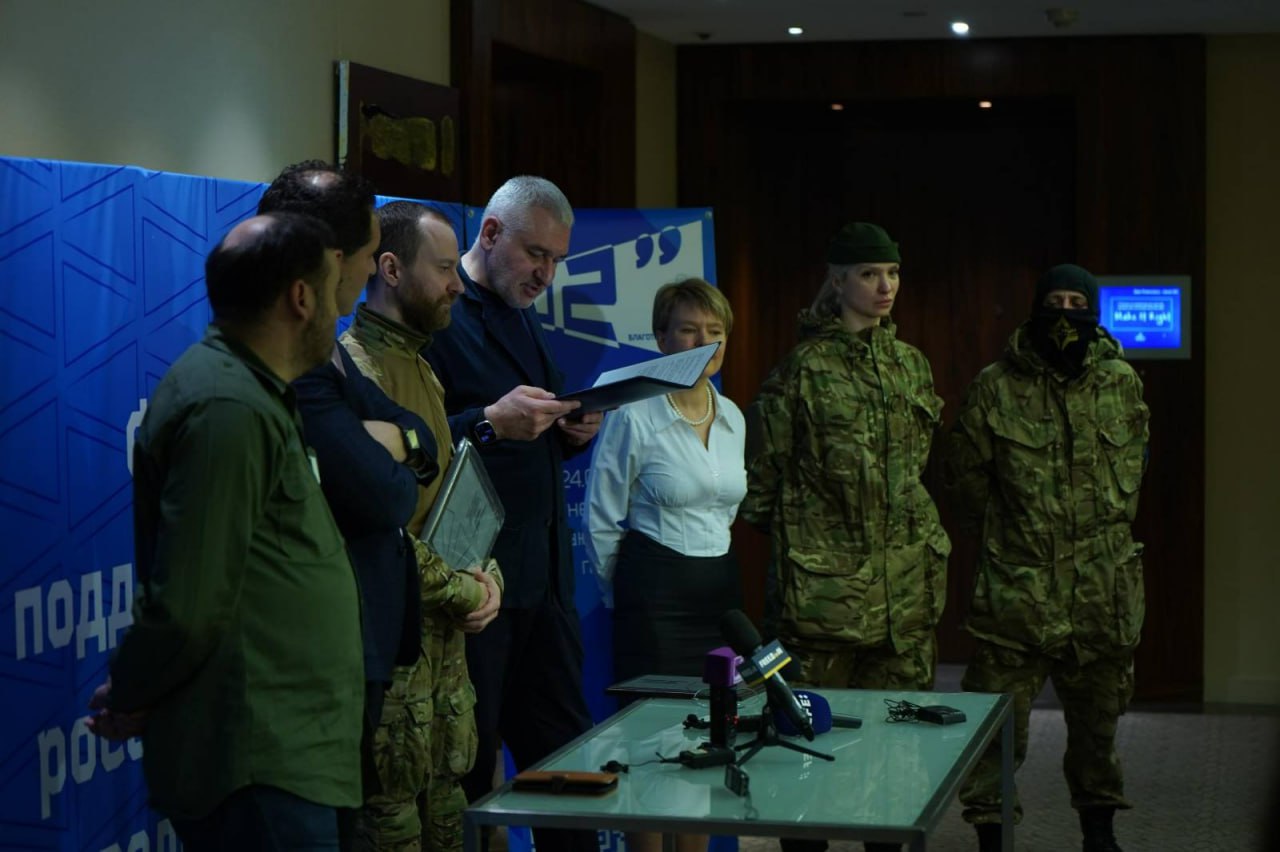
Days before the press conference, Russian opposition figures expressed their support for the armed battalions at the first Forum of Support for Russian Volunteers.
In the memorandum, signed by such personalities such as human rights lawyer Mark Feygin, chess grandmaster and political activist Garry Kasparov, and environmentalist Yevgeniya Chirikova, they called upon all anti-Kremlin Russians to join or support the Russian Volunteer Corps, Free Russia Legion, and Siberian Battalion.
Related:
- Anti-Kremlin battalions announce offensive operation inside Russia against Putin’s regime
- Ex-Wagner fighters join Russian volunteer forces, battling for Ukraine on Russian soil
- Freedom of Russia claims it took control of Tyotkino in Kursk Oblast
- Anti-Kremlin Siberian Battalion claims to have entered village, captured local administration in Russia’s Belgorod Oblast
- Russian Volunteer Corps fights for Ukraine and to dismantle Putin’s regime (2023)




